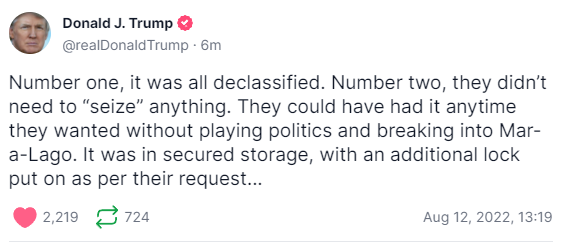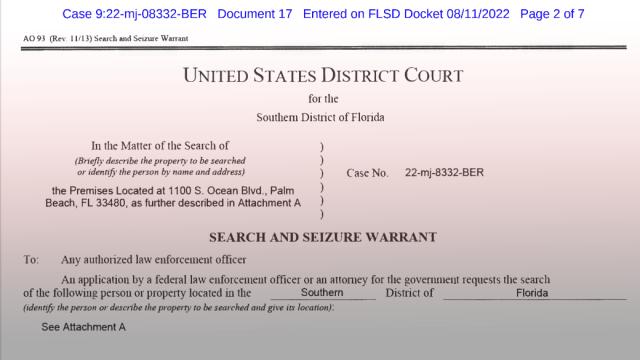A federal judge in Florida has unsealed the search warrant served on former President Donald Trump’s Mar-a-lago estate Monday in what Justice Department officials said was an attempt by the FBI to reclaim classified materials improperly removed from the White House last year.
A copy of the warrant and receipts for the items seized by FBI, which describes a range of highly classified material — some above “top secret” — is embedded below. One noteworthy document indicates the FBI’s investigation encompasses multiple criminal statutes, including a provision of the Espionage Act that outlaws unauthorised “gathering, transmitting or losing” of U.S. defence information.
[Click here to see the documents if the embed doesn’t work on your device.]
The 7-page document, sealed until Friday in the U.S. District Court for the Southern District of Florida, shows the FBI’s search of Trump’s private club and residence included the former president’s personal office, storage rooms, and other areas open to Trump and his staff. The FBI was not allowed to enter areas occupied or rented by the club’s other members, the paperwork says.
“They even broke into my safe,” Trump said in a statement the day of the raid. The Justice Department argued in court on behalf of unsealing the warrant citing Trump’s acknowledgement of the investigation publicly and the “intense public interest” generated by the unusual search of a former president’s property.
The unsealed records do not include the FBI’s affidavit, which would lay out its case for probable cause for conducting the search, as well as indicate how it knew specific documents it was after were located on the property.
The FBI sought documents with classified marking as well as records covered under the President Records Act, a post-Watergate law aimed at preventing the destruction of White House records. (Only the National Archives and Records Administration can authorise the destruction of records generated during a presidency, and will only do so when the records no longer have “administrative, historical, informational, or evidentiary value.”)
The FBI was also after any communications that might pertain to the transfer or storage of national defence information and classified material, the papers show.
The last three pages contain receipts describing the materials seized from the Florida property. They list numerous unspecified documents and containers, including a clemency document Trump signed on behalf of his longtime advisor and confidant Roger Stone, who was convicted of lying to Congress during its investigation into Russian meddling in the 2020 election.
Among the seized items are 11 sets of documents classified “secret” and “top secret,” the papers show. One set is marked both “top secret” and “compartmentalized,” meaning they contain classified information tightly controlled to minimise exposure even at the highest levels of government.
Secret compartmentalized information can include details about intelligence sources and methods, some the intelligence community’s most closely guarded secrets.
Federal investigators had served Trump with a grand jury subpoena this spring in effort to retrieve what appears to be a considerable amount of documentation improperly transferred to his Florida estate. The National Archives, which has overseen the handling of president records since the late 1970s, reportedly arranged to retrieve 15 boxes of material from Mar-a-Lago in January.
Attorney General Merrick Garland, while not confirming the existence of the subpoena during a press conference Thursday, said that it is “standard practice” at the Justice Department to “seek less intrusive means as an alternative to a search” whenever possible.
“Upholding the rule of law means applying the law evenly, without fear or favour,” Garland said. “Under my watch, that is precisely what the Justice Department is doing.”
The Washington Post reported Friday, citing sources familiar with the investigation, that classified documents relating to nuclear weapons were among the documents sought after by the FBI. If true, this would cast serious doubt on claims by Trump that he’d already declassified the documents before taking them. There are certain materials that even a U.S. president is not permitted to disclose, including nuclear secrets and information that might expose covert operatives.
“It was all declassified,” Trump said on his Truth Social platform Friday, after having earlier called publicly for the release of documents supporting the FBI action. Trump, as the target of the warrant, would have seemingly had access to those materials already. It is unclear why he did not simply publish them himself.
The contents of both the warrant and receipts were first reported ahead of their unsealing on Friday by the Trump-friendly website Breitbart News. The outlet did not initially share the documents publicly, opting instead to paraphrase select portions on its website. Included were the names of multiple FBI agents — information that was ultimately redacted in the copies made public by the court.

“They could have had it anytime they wanted — and that includes LONG ago,” Trump said in a post. “ALL THEY HAD TO DO WAS ASK.”
Trump’s allies have likewise questioned the necessity of the search, asking on cable news and in other forums why the FBI choose not to pursue less aggressive tactics.
“How come they had to do it this way?” Michael Mukasey, the former U.S. attorney general from 2007 to 2009, asked on Fox News Thursday. Pointing to Garland’s remarks about the DOJ’s preference for less intrusive methods, Mukasey said he should have gone a step further and disclosed why it felt the warrant was necessary, adding that Garland could have done so without revealing information under seal.
“He didn’t tell us. And that is a large gap,” he said.
